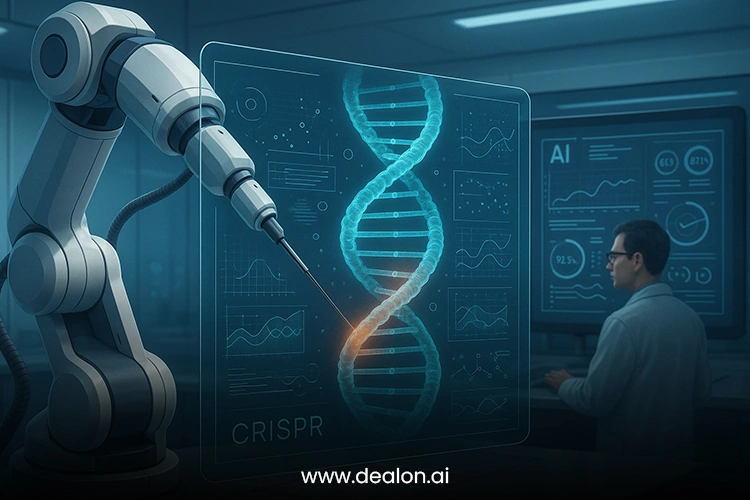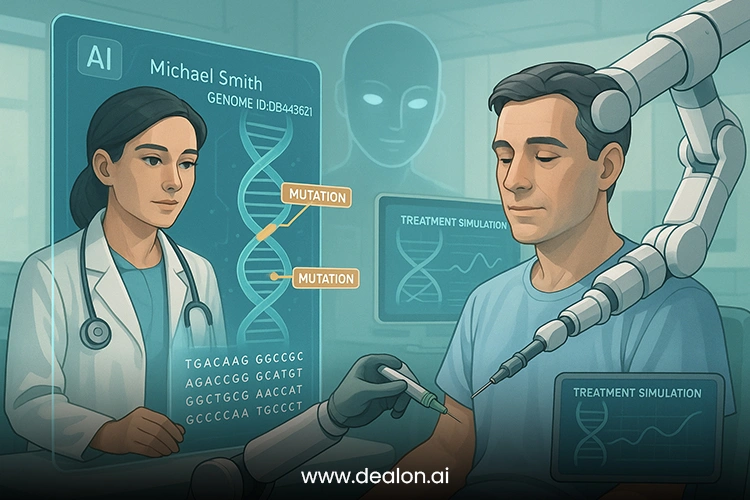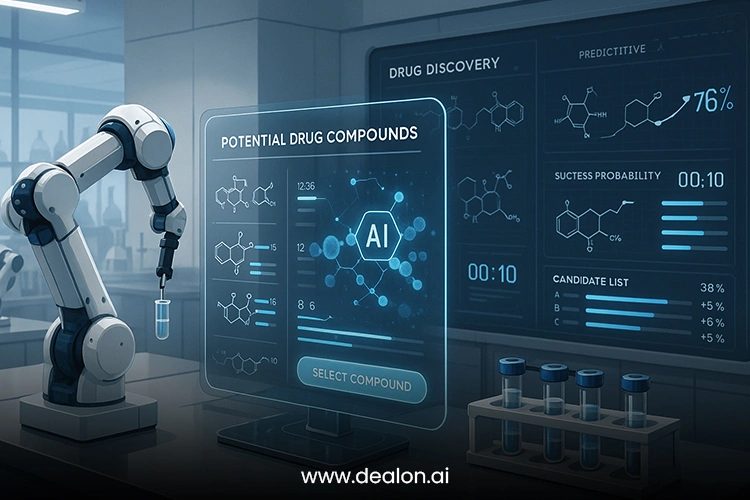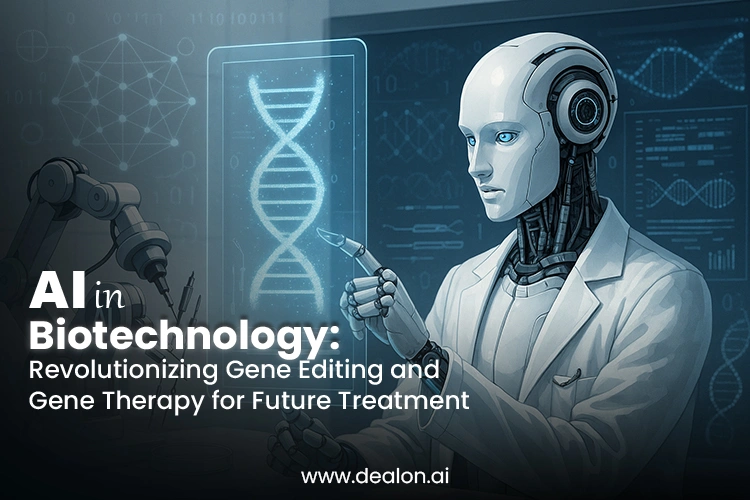Combining AI with biotechnology leads to essential advancements in editing genes and treating genetic diseases, making personalized medicine, genetic disease treatment, and optimizing human health possible. In the past, gene editing and therapy required a lot of time, needed experts, and involved a lot of trial and error. However, introducing AI is changing these sectors significantly with more accuracy, efficiency, and personalization. AI software can look through massive data sets, predict possible results and advise care providers in choosing the best treatment, all with great accuracy and speed.
AI has had a significant effect on the field of gene editing. Algorithms for machine learning are capable of finding the best ways to edit different genes, reduce mistakes, and make sure everything is safe. AI is helping researchers understand the genetics of other diseases and lead to treatments that target those genes. Predictive modeling and deep learning in AI allow us to estimate how gene editing will work and the possible off-target problems, which help make genetic modifications safer and more effective.
Just like that, AI is helping gene therapy become more customized by using each patient’s genetic information. Using AI, doctors can find out which variants in a patient’s genes are linked to specific diseases, leading to more personalized care. Following this approach is more likely to help you and causes fewer side effects.
The surge in AI use will only lead to deeper engagement with biotechnology, which will significantly advance health, improve lives, and hopefully cure many previously incurable diseases. Gene editing and therapy are advancing today, and AI is taking the lead.
AI and Gene Editing: Precision at Unmatched Levels

Using gene editing, scientists now have the power to change DNA with great accuracy. CRISPR-Cas9 and similar traditional methods have made targeted modifications possible, but improvements with AI have made gene editing even more advanced. AI can examine genetic data and develop predictive methods for choosing the proper gene-editing process to address various illnesses.
AI improves gene editing by looking at complicated DNA, finding the right way to edit specific genes, and preventing changes in unintended areas. With AI, scientists have more control to focus changes where needed and avoid unintended outcomes. AI can simulate possible risks, which helps predict unexpected mutations or side effects from the edited genes, making genetic interventions safer.
In addition, AI speeds up gene editing by helping researchers look at and edit thousands of genetic sequences simultaneously. It dramatically improves efficiency so that scientists can study many genetic pathways and their influence on disease treatment in extensive studies. With advanced AI, conducting sophisticated genetic analyses will be possible, which will allow researchers to come up with unique treatments for genetic disorders at record speed and accuracy.
Thus, merging AI and gene editing can make gene editing more exact and may cure previously incurable genetic diseases, helping bring personalized medicine to more patients.
AI in Gene Therapy: Personalized Treatments for Genetic Disorders

For a long time, gene therapy has been a leading method to fix genetic disorders by changing or replacing the affected genes. Still, even though it holds a lot of promise, the many challenges of genetic diseases mean that medicine for these illnesses is rarely customized for individuals. Artificial Intelligence (AI) in gene therapy is helping to give patients personalized care based on their genetic makeup.
AI allows for much larger parts of the genome to be processed, transforming how genetic diseases are approached and managed. AI enables the identification of distinct genetic versions responsible for disorders. AI can now accurately diagnose the leading causes of genetic problems, which helps form personalized ways to treat them.
With the genetic problem known, AI can guide doctors to use gene therapy that better targets the problem, boosting the treatment outcome. Because of AI, control over the delivery of CRISPR and similar gene-editing tools can be precise, raising the chances that the gene will be put right where it should and lowering the chance of off-target results or mistakes.
AI also increases safety by foreseeing possible adverse reactions for each patient, considering their unique genetic makeup. Because AI helps reduce dangers and improve success, gene therapy is now considered a safer and better option. As AI develops, doctors will increasingly use personalized gene therapies to help many individuals who were previously unable to be treated for their genetic diseases.
AI in Drug Discovery: Accelerating the Path to Therapies

Getting a new drug from the idea stage to actual clinical application in biotechnology has usually been lengthy and resourceful, sometimes taking several years. Because of trial and error, extensive testing, and long clinical trials, traditional methods are both slow and costly. Nevertheless, the development of AI is significantly shortening the process and improving the reliability of drug discovery.
AI is revolutionizing drug discovery by being able to study large amounts of information about chemicals and living things. AI uses these data to predict which compounds from potential drug candidates are the best to be further investigated. Relying on the data enables researchers to swiftly identify a few possible solutions, reducing expensive and time-consuming lab work. In gene therapy, AI helps find genetic parts that may benefit from treatment for conditions such as rare genetic disorders or cancer.
Using predictive modeling, AI helps researchers predict how drugs react to different genetic alterations, speeding up the selection of promising drug candidates. As a result, the process becomes quicker, and drug choice is more precise, leading to better results during clinical trials. Because AI can forecast what a drug will do in the body, scientists can immediately anticipate the side effects and choose the best dosage for each patient.
Also, by predicting how people will react to gene therapies, AI ensures these treatments are practical and safe for many people. By focusing AI on drug development and not relying on outdated testing methods, we can make more targeted therapies to help people with genetic diseases get rapid, safe, and effective treatments. Biotechnology lately depends on AI which makes it easier to use precision medicine.
AI-Driven Bioinformatics: Unlocking the Secrets of Genomic Data
Using AI to transform biotechnology greatly depends on bioinformatics, which collects and interprets genetic data. Because the human genome contains more than three billion base pairs, so it is a vast and complex data set. Without AI’s sophisticated capabilities, finding helpful information in all these data would be tough.
AI technology in bioinformatics allows researchers to handle tons of genetic data, find different variants, and learn about their connections with disorders. Exploring massive genomic data with machine learning can uncover signs that are hard to notice with conventional statistics, allowing for finding new early diagnosis indicators and possible treatments. Additionally, AI increases the pace of comparative genomics by letting scientists find out what is the same or different in genomes between different species. This information about evolution, diseases, and prospective treatments develops.
This type of comparison helps scientists create effective and safe treatments when they edit genes. AI and bioinformatics combined allow for population genomics, which looks at the DNA of large numbers of people. With these studies, experts can discover the genetics behind diseases such as cancer, diabetes, and brain disorders, making it possible for precision medicine to serve diverse people.
AI helps by allowing us to instantly monitor gene changes in viruses that are evolving rapidly. During the pandemic, AI helped to find new mutations in the virus, gave updates about public health decisions, and supported the development of vaccines. When AI bioinformatics advances, individuals may benefit from easier and more accurate diagnoses and personalized medical treatments using their genetics. Constant updates from fresh data allow AI to follow changes in genetics, making biotechnology research more flexible and responsive.
Ethical Considerations and AI’s Role in Genetic Modification
As AI enhances gene editing and therapy, it is making significant breakthroughs in biotechnology, aiming to heal genetic diseases and improve health. At the same time, the ability to modify DNA puts up several critical ethical issues. Modifying the genetic code could result in many risks, mainly from those who misuse the technology or if unforeseen harms occur and continue over future generations. Deciding whether parents can have designer babies or alter human traits to boost abilities puts extra challenges in place and means these decisions must be highly regulated.
AI is playing a key part in making sure gene modification is ethical. A significant benefit of AI here is that it can forecast the lasting outcomes of changing the genome. Analyzing large datasets and using predictive models, AI helps to notice off-target mutations earlier which helps to prevent serious risks during the editing process. Predicting risks helps deter people from using gene editing for things that are not important, such as making changes to appearance.
AI also supports establishing regulatory rules for gene therapy by advising and advising on safe and ethical ways to develop the field. Analyzing data as it happens, AI can examine whether genetic treatments are safe and effective and ensure new genetic advances do not go too far without considering ethics. Furnishing evidence-based advice, AI enables those in policymaking, science, and healthcare to decide what’s best for patients and evaluate the potential moral issues of gene editing.
Responsibly using gene modification technology depends on AI’s key role in the related ethical issues. Applying AI to decision-making ensures we maximize the advantages of gene editing and therapy. At the same time, we reduce the risks and make sure these technologies help everyone.
The Future of AI in Biotechnology: A Horizon of Possibilities
AI has much potential to significantly impact biotechnology, especially in gene editing and gene therapy. Because AI is changing, it will affect these fields much more broadly than before. Adding improved MLAs and access to vast amounts of genetic data to AI can enhance precision, tailoring, and effectiveness in research and developing new therapies. Thanks to this advance, scientists can give precise treatment to individuals with genetic diseases since they can target the exact cause of each disease. As treatments can now be tailored, this approach will lead to better safety, improved treatments, and fewer side effects.
AI will play a central role in predicting genetic mutations before they cause diseases, which can lead to the development of preventative treatments. If we can alter genes, treatment results will be better. It also brings new ways to handle aging, fight diseases and extend our lives, improving human health.
Apart from medicine, AI in biotechnology will affect many other areas. Using artificial intelligence, new farming techniques will be created that help crops resist droughts and pests, strengthening food security as global temperatures rise. AI supports genetic changes that produce biofuels or organisms that take in environmental carbon, joining efforts to control climate change. Using AI and biotechnology could result in genetically changed organisms that can survive in areas such as Mars to support people living and working there in the long run.
With AI in biotechnology, there are endless opportunities to change healthcare, farming practices, the environment, and exploration of outer space. If we keep adding AI to spaceflight and other areas, we can expect notable changes that will help both on our planet and in outer space.
Enhancing Drug Development and Personalized Treatments
Besides changing gene editing and therapy, AI plays a key role in drug development in biotechnology. AI uses broad data to identify drug candidates fast and with greater accuracy which helps speed up and save money during drug discovery. The predictive nature of AI plays a significant role in narrowing the search for effective treatments for unusual genetic disorders.
With the help of AI, doctors can use personal genetic information to choose treatments that are best for each person. Due to the promotion of precision medicine, drugs are now used in the best and most harmless ways possible for patients. As AI changes, it will support the development of effective medications, reduce the time for discovering new treatments, and contribute to better patient healthcare.
Combining AI and biotechnology in this way is predicted to improve the way we manage and treat diseases that affect genes. AI in healthcare is making it possible to provide personalized medicine that helps some conditions that were not thought to have treatments before.
Conclusion
Researchers are looking forward to many scientific and medical benefits, especially regarding gene editing and gene therapy, due to AI in biotechnology. When used with modern machine learning and genetic records, AI boosts how exact, efficient, and individual gene studies and treatments can be. It helps find new cures for genetic illnesses and opens up the way for treatments designed especially for each patient’s genetic makeup. Because AI-supported methods can greatly extend human lives and health, precision medicine is now a possibility, not just something that might be possible far in the future.
AI also plays a role beyond just healthcare. How this technology benefits farming, environmental responsibility, and space research reflects its broad applications. AI is ready to change industries that rely on biotechnology by improving farming methods, growing organisms that lock in carbon dioxide, and making space missions with genetically modified beings possible.
AI will play a bigger part in biotechnology, leading to new solutions that better the world for humans, nature and many other areas. AI will open new chances for development, innovative breakthroughs and major shifts across several fields in biotechnology.

